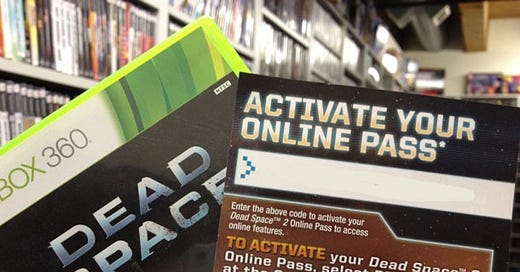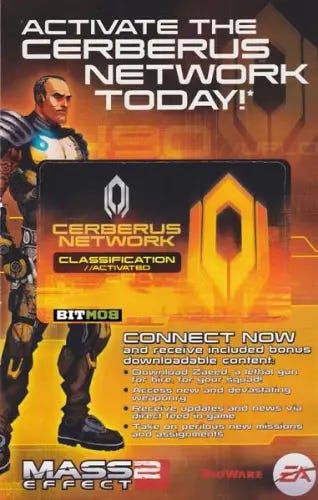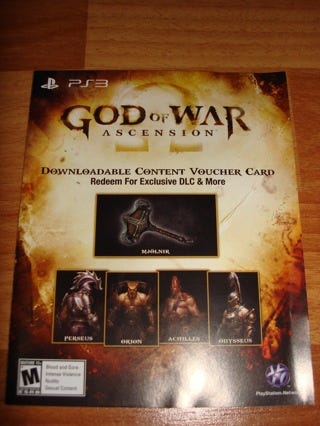The Necessary Death of The Online Pass
A look back at the history of the online pass and how it was killed
Gaming has seen its fair share of trends come and go. Arcades, full-motion video, the music game genre, memory cards, instruction manuals, 3D implementation, and physical media. The list goes on and on. We’ve recently been introduced to a load of trends that will no doubt be dead in the next decade or so but I thought I’d take a look at one gaming trend that died just as soon as it was born over a decade ago: The online pass.
Corporations have always rallied against piracy, especially in gaming. It practically killed the Dreamcast, which has one of the best game libraries ever. You might remember that at one point the Xbox One even restricted used games before backtracking after Sony dropped probably the best diss track of all time. Before that, the online pass was the method of choice for companies looking to fight back against used games.
It was a way for gamers to play games online. If you were to buy a game like FIFA back in 2011, you’d need one to play the game’s multiplayer. This shouldn’t have been a problem as every new copy of the game had one inside. But used copies? That’s where the greed begins.
If you’ve bought a used game before, you’d know that they typically don’t come with the instruction booklet. During this time, it was rare they came with the online pass it was shipped with. A lot of them were sometimes printed on the back of the instruction manual. To make things worse, sometimes you’d get one with your used game and it would already be used.
I remember getting the online pass for Skate 3 and Little Big Planet 2 despite buying used copies. If I weren’t so lucky, I would have had to pay at least 10 bucks for one from PSN or Xbox Live. The purpose of online passes was to stop consumers from buying used games, which were always cheaper than the full-price retail version. The reason companies despised used games so much wasn’t that they were cheap but because they couldn’t profit from them. They only got a profit from the game’s initial sale, not the subsequent resale or resales.
EA Introduces the Online Pass
The trend got its start in the ancient year of 2009 by none other than everyone’s favorite consumer-friendly corporation, EA. Around this time, you’d go buy a game at launch from a store, and just for buying from one of the first-week copies you’d get a code for some bonus DLC.
Sometimes this still happens today. These were usually DLC codes that gave some small bonus content like a weapons pack or an XP boost. Sometimes these were also the game’s pre-order bonuses which made it pointless to pre-order. EA saw this concept and decided to apply it in the never-ending war against used games.
In late 2009, they introduced “Project Ten Dollar,” an initiative that sounded beneficial for consumers but was the complete opposite. This was a combination of the online pass and those DLC codes. Think back to the example I gave where you buy a used game and it didn’t have the code or the one included had already been redeemed.
Now imagine that situation except the code also gave you some bonus DLC as well as access to online multiplayer. Without that code, you’d be forced to spend money not only on a new Online Pass but that DLC content as well if you wanted it. However, EA and other companies were nice enough to offer a 7-day free trial for the multiplayer but after that, you had to pay up. It also didn’t help that EA was forcing multiplayer and online functionality into all of their games so they’d have an excuse to use this program.
One of the worst examples of this was for Mass Effect 2. If you were to buy the game at launch from Gamestop back in 2010, you would have been given a code with your brand-new copy. The game didn’t include any multiplayer so what did this code do? It let you access the Cerberus Network, an in-game digital storefront that let you buy the game’s DLC content. That’s right: EA was going to charge you for the ability to buy DLC. How much did this code cost if you bought a used copy with no code? 1200 Microsoft points which converted to about $15-$16.
We all know that you can buy 10-dollar PSN and Xbox cards these days but back then? I remember only seeing 20 and 50-dollar ones. So if you were a kid like me and the online pass for a game was ten or fifteen bucks, you’d have to buy a 1600 Microsoft points card with your allowance.
After using 800 or 1200 of those points on an online pass, you were left with about 400 or 800 points that you couldn’t spend because anything you wanted to buy cost more than that. You would just be stuck with these points in your account not able to spend them on anything worthwhile except probably your next online pass because you were probably buying games used.
EA wasn’t the only company getting greedy with this idea. Sony jumped on the bandwagon too pretty early on. SOCOM: US Navy SEALS Fireteam Bravo 3 for the PSP had an online pass to fight against piracy on the PSP. Anyone who bought a used copy without a code was forced to pay $20 for access to the multiplayer. Fans were not happy despite Sony Computer Entertainment America’s director of hardware John Koller claiming this would receive a positive reception from fans. It did not.
Sony decided that giving the middle finger to its PSP customers wasn’t enough. They had to do it to the PS3 ones as well. In 2011, they launched the PSN Pass, an online pass for their upcoming games such as Resistance 3 and Uncharted 3. Once again, fans were pissed while Sony claimed they were “enhancing premium online services across our first party game portfolio." Whatever that means. This program would continue well into 2013, keep that year in mind, featuring PS3 exclusives such as Ratchet and Clank All 4 One, SOCOM 4, Twisted Metal, Wipeout 2048, and God War Ascension.
Elsewhere other companies were also trying to screw over their customers with online passes. Ubisoft announced in July 2011 that the then-upcoming Driver San Francisco would require the Uplay Passport. I don’t have to say much about this. It was pretty much a knockoff of Mass Effect 2’s Cerberus Network except this one would have had multiplayer. It’s too bad for Ubisoft that the program was canceled five days after the game launched due to a printing error with the Passport codes.
While we’re on the topic of errors, Ninja Gaiden 3 had an online pass that also suffered from errors at launch. Players were locked out of the multiplayer mode as a result. The issue was so bad that I learned all this from a Game Informer article in which they revealed that their review for the game was delayed since they couldn’t even play the multiplayer.
Who would have thought that tying access to a game’s online multiplayer to a code would cause so many issues? Googling “online pass issues” brings up a bevy of articles from the past 2 to 3 years mentioning how a lot of the content you gained from these online passes is now unavailable due to online passes being delisted.
This means that the multiplayer for a lot of these 10-year-old games, many of which are still stuck on the PS3 and 360, isn’t accessible either. This also means a lot of trophies and achievements are also no longer earnable. “Hey, loyal customer: We know that this system to fight against piracy is incredibly flawed and is anti-game preservation but at least you can get free armor in Mass Effect!”
Online passes eventually did go away but how? Well, we have EA to thank for that. In 2013, as we approached the then next-generation of consoles, EA killed them. Here’s what John Reseburg, their director of corporate communications at the time, had to say about this:
It sure is great that EA waited 3 years to actually listen to their customers but it’s better late than never right? Also, you’ve gotta love that statement. “Oh we were trying to give players this nice benefit but they didn’t like it so oh well.” No, you greedy corporate ghouls launched an attack on the frugal/poor gamer in an attempt to earn as much money as possible. Online passes were nothing but a tax on the poor.
I mentioned used games before but did you consider renting games with an online pass? A lot of people would rent games from Blockbuster growing up because their parents couldn’t afford to spend 60 bucks on the newest games every month. Can you imagine how many kids got games between 2010 and 2013 only to not be able to play online with their friends because companies like EA wanted to package “a full menu of online content and services?”
If it weren’t for Sony embracing used games with the PS4 and forcing Microsoft to do so with the Xbox One, we might have still had online passes on those consoles. Ubisoft launched Assassin’s Creed 4 that year with yet another Uplay Passport. Before players could even get their hands on the next-gen versions, they canceled it because players hated being locked out of extra content.
Like EA, the company waited until years after people had started complaining to actually respond to those complaints. At the end of 2013, the online pass was pretty much dead. The last game I can remember having one was Batman Arkham Origins. It came with a code to unlock Deathstroke and some skins but the multiplayer was free.
Online Passes are ancient history. I’m saying this as a figure of speech but trying to find any info on them is like finding a needle in a haystack. So many of the search results are plagued with Xbox Game Pass ads or news articles. It’s like the internet collectively decided to erase them from existence.
As happy as I am that online passes are dead, they shouldn’t be forgotten. They’re definitive proof that things haven’t changed much when it comes to the relationship between the company and consumer in gaming. We’ve seen time and time again what these companies will do just for an extra buck. We’ve moved on from online passes to microtransactions and God knows what’ll be next.








